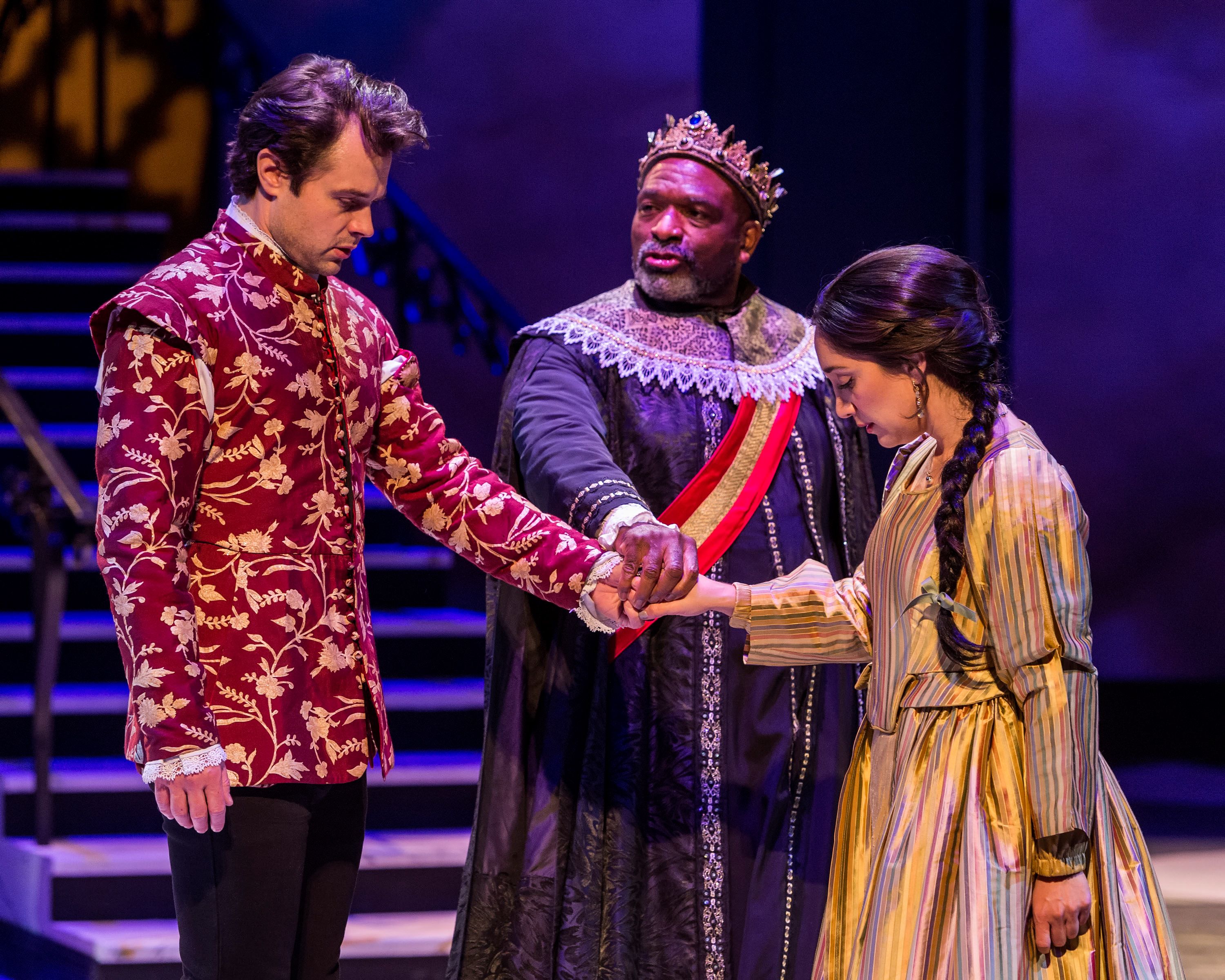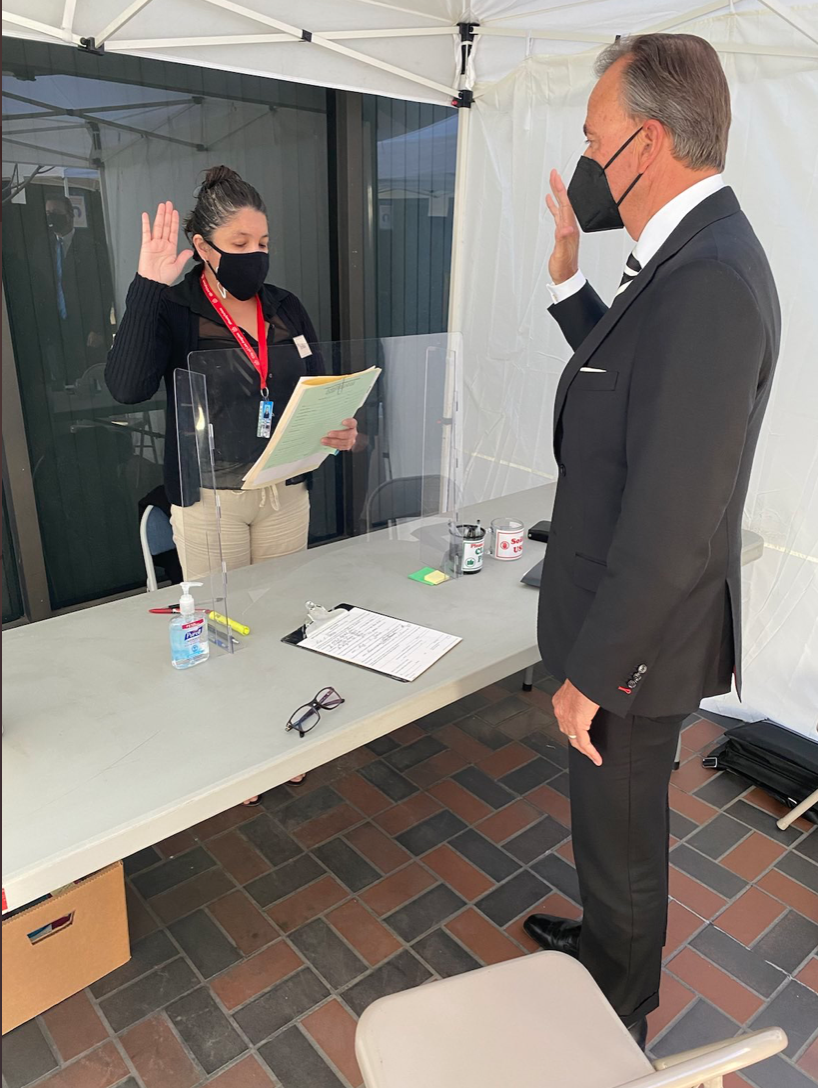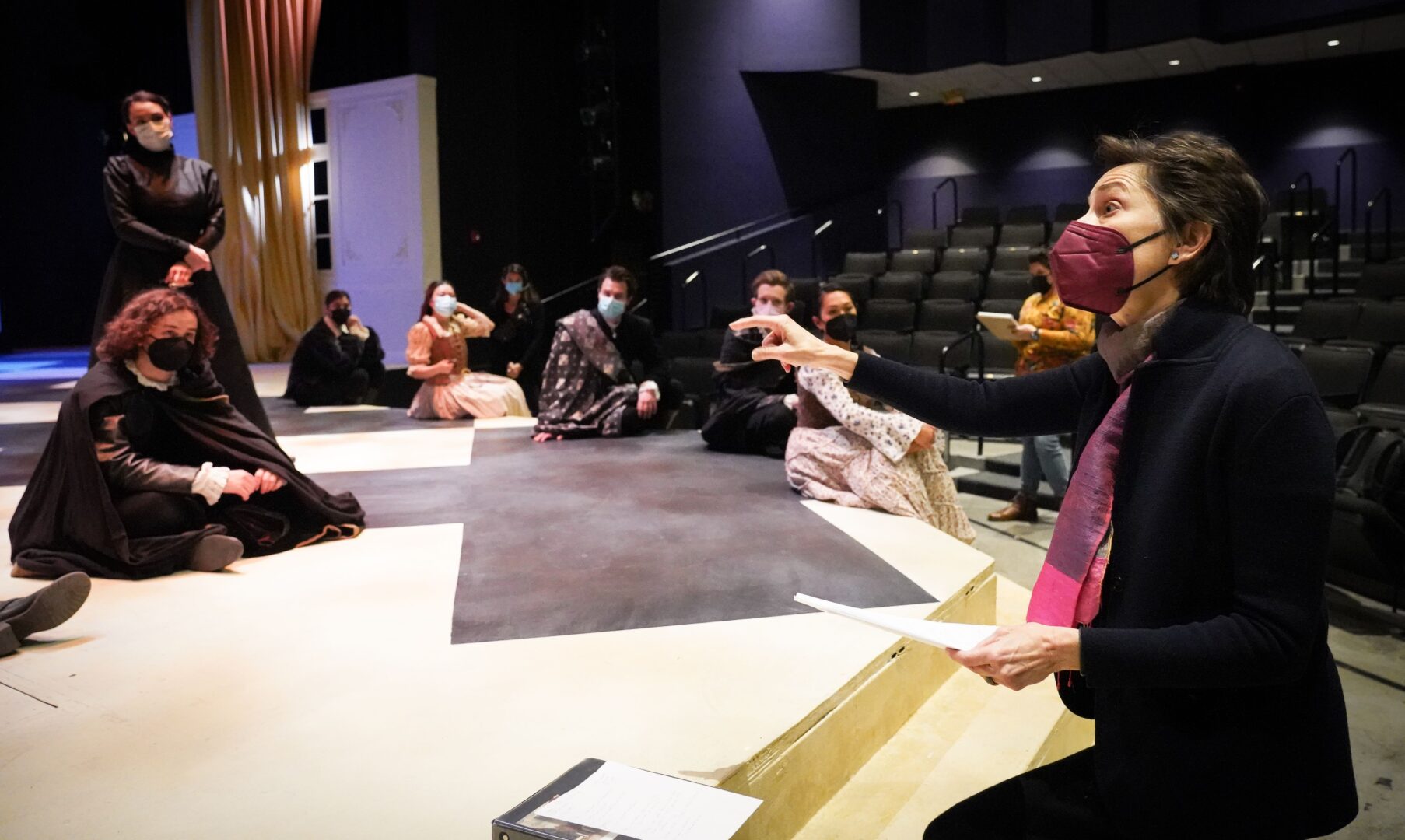
A Noise Within (ANW) starts the new year with Shakespeare’s “All’s Well that Ends Well,” the fourth production during its 30th anniversary season. On stage from Feb. 6 to March 6, it stars resident artist Erika Soto as Helen and Mark Jude Sullivan as Bertram. Nike Doukas directs this comedy that follows Helen and Bertram as they try to realize their individual dreams before they are eventually united in a fairy tale ending.
“All’s Well That Ends Well” focuses on Helen, a young healer, who convincingly persuades a cast of fools, romantics, and cynics to pursue Bertram, her runaway groom. In a play of wit and deception, these two characters take us with them as they go on a journey of forgiveness, hope, and love where we least expect it.
The play isn’t one of Shakespeare’s popular works, hasn’t been staged as often as his other comedies, and is even referred to as a problem play. Doukas has made it her goal to change that last reference and she might very well have the credentials to do so. She earned her MFA from the American Conservatory Theater (ACT) in San Francisco and is primarily a theatre, film, and television actress. She is also a well-known accent coach and has been directing for five years now.
Twelve years ago, she joined the faculty of the Art of Acting Studio in L.A., the sister school of the Stella Adler Studio of Acting in New York City (formerly the Stella Adler Conservatory) where she’s the head of acting; a main responsibility is teaching Shakespeare. Her students go on to work professionally and, in fact, one of them – Niek Versteeg – is in this production of ‘All’s Well…’ as the Second Lord Dumaine.
While this marks Doukas’s directorial debut at ANW, her association with the repertory company and co-artistic and producing directors Geoff Elliott and Julia Rodriguez-Elliott dates a while back. She recalls, “We worked together on many Shakespeare productions as actors early on. ANW puts on one Shakespeare production every season, and sometimes they’d call me to help make the text clear for the actors to understand.”
“And my career as accent coach actually started in the very, very early days of A Noise Within when they were still at the Masonic Temple in Glendale,” adds Doukas. “Geoff and Julia knew I was good with accents and they asked me to do the accent coaching for ‘Our Town.’ It turned out to be a lot of fun so I still do that whenever I’m available.” She was the accent coach for ANW’s previous productions of “The Glass Menagerie,” “Othello,” “A Christmas Carol,” “Tale of Two Cities,” “Mrs. Warren’s Profession,” and “Noises Off.”
Asked how she became good with accents, Doukas replies, “It happened organically – I grew up in a family that spoke Greek; my two older sisters are conversational in Greek but I speak it poorly. It’s much like growing up in a musical home, you can’t help but be a little musical. And, being an actor, I was able to use and develop it. When I was at ACT, that was one of the things we had to learn. I did several plays where I had an English accent so people began asking me to help out. It wasn’t something I went after; it was merely happenstance.”
Doukas had pitched a couple of plays to Elliott and Rodriguez-Elliott but this was the first time their schedules meshed. She explains, “It was just timing. They plan seasons and I think they felt this was the right time. They wanted me to direct a Shakespeare play and they liked the idea for ‘All’s Well…’ that I suggested to them. They also felt it fits in with what’s going on in the world right now.”
“Besides, they do so much Shakespeare they wanted to find a play they hadn’t done in a while,” continues Doukas. “And this is one I truly love. Like all Shakespeare plays, it isn’t about one thing – it’s layered. I definitely see that there are two parallel stories: one is that of Helen who is desperately trying to make the world right by joining her life with Bertram’s and the other is that of Bertram who feels stifled at home and is urgently trying to make adventures, go to war, and meet other people.
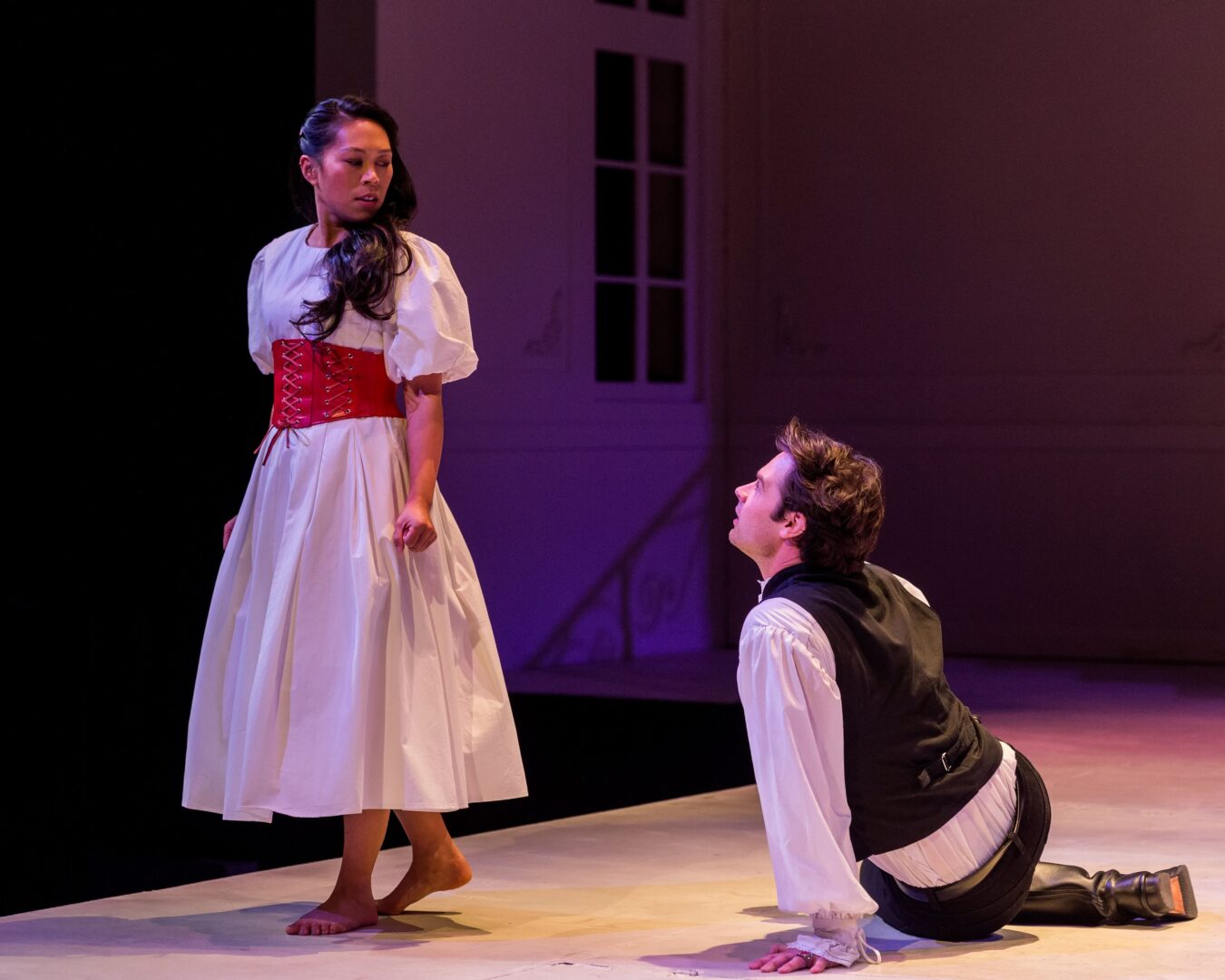
“In the play, Bertram finds himself being pushed into marrying Helen whom he thinks of as a little sister. However, he wants agency; he intends to discover himself and what he wants to do in life. So he resists what everyone else recognizes – that Helen is the right person for him. It takes them both a long time, as they go on a physical journey until they’re ready to find each other again.”
Because ANW is a repertory company, Doukas was able to work with actors she already knows. She states, “Knowing them beforehand made my job easier. They have such a wonderful complement of actors there. When it came to casting the play, I knew who would be right for what roles; at least half of the roles are filled with company members. I believe there’s strength in an ensemble where you work with people over and over again; there’s a vocabulary that you share. At the same time, I think audiences really enjoy seeing actors play different roles.”
Doukas says of the experience, “It has been exciting and challenging. Because of Covid, we spent the first week rehearsing on Zoom. Then we got into the theatre while adhering to all the safety protocols. On our third dress rehearsal, we didn’t wear our masks for the first time. That threw them off and they kept forgetting their lines. They sort of memorized each other’s face with their masks on and they felt strange to be without the masks. But everyone has been a real trooper; we were being extremely careful because we’re all aware that shows have been delayed, or have ended, and we want to make sure we get the show up.”
That “All’s Well…” features strong female characters isn’t surprising, according to Doukas. “I think Shakespeare loved women … and he liked them. He thought they were smart, funny, strong, and brave. In this play there are two phenomenal female roles: Helen, who’s the central character, and there’s the Countess of Rosillion (played by resident artist Deborah Strang) who’s like her adopted mother. Helen is the engine for the play – she’s the mover and shaker. Directly or indirectly, she drives almost everything that happens. The countess is sort of her biggest cheerleader and helps her when she could.
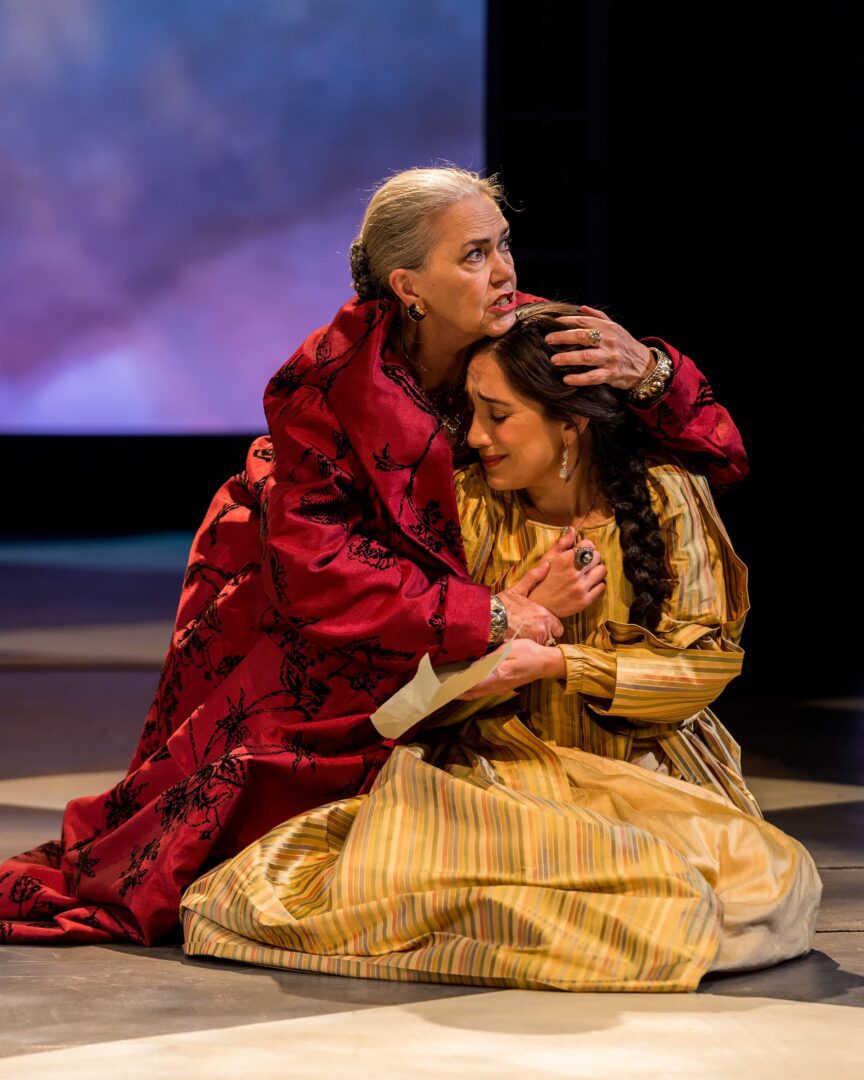
“But it’s true of all the characters. What I love most about this play is how kind everyone is to each other. It’s almost like ‘it takes a village.’ Everybody recognizes that Helen and Bertram are these wonderful human beings who need help. It’s a beautiful thing to see these strong, kind friendships being forged. Everyone is rooting for the main characters and helping them make the right decisions in their life.”
Doukas is heartened that women are now taking on bigger roles and responsibilities in theatre. She reminisces, “I’m old enough to remember that as a young actress, if you were in a Shakespeare festival, there might be three women in it and the rest were men. You looked around and thought ‘Boy, am I lucky to be here!’ Every once in a while you’d have a woman directing. But that’s just not true anymore. It has been very easy to cast women in men’s roles in Shakespeare productions. In fact, in ‘All’s Well…,’ half the company is made up of women; we have three men roles being played by women and it works very seamlessly.
“Historically, there were often great roles for young women and older women but there was this big middle age where women just disappeared. Women also didn’t typically run the play – unless it was a Shakespeare play which has great heroines like Rosalind, Viola, and Helen. There are great playwrights from the past – Ibsen and Chekhov – who wrote strong female protagonists but we went through a long period like the 60s when fantastic roles for women were few and far between. And I’m very happy to say that’s over.”
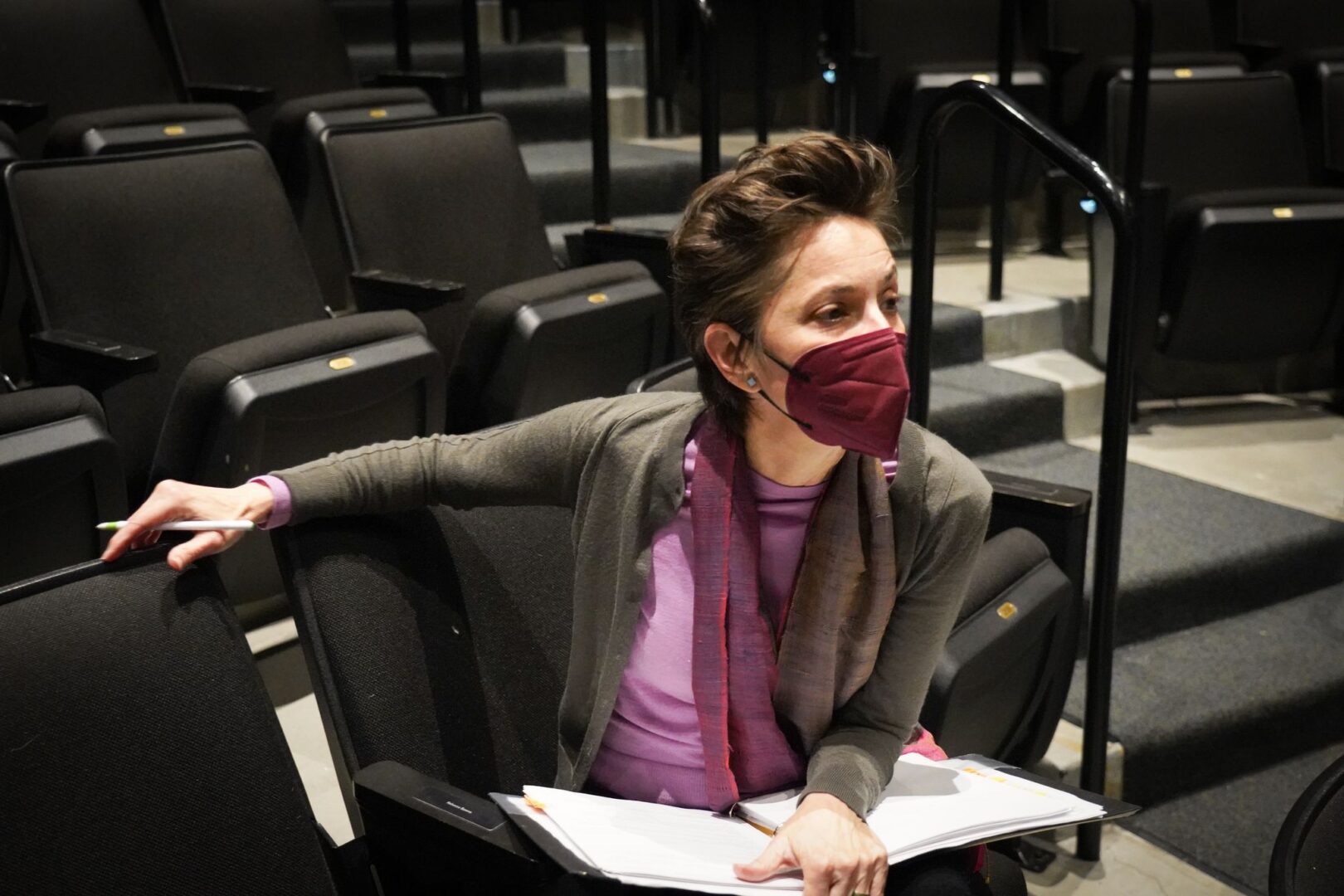
“Women playwrights are getting more opportunity – they’re writing about themselves and what interests them,” Doukas expounds. “When that happens, we get plays that are centered around women. I think women directors are also getting more opportunity so there’s more female perspective. It’s more equitable when everybody gets a chance. And, maybe more importantly, you start seeing what the world really looks like. I find that really exciting. In my experience in theatre, I find that men have been open and receptive to it. Because it’s not going to work unless we all agree that we want playwriting and directing and acting to be equal opportunity. When we stop competing or fighting each other, that’s when we can really make great art. What’s been really gratifying to me is that I feel women are stepping up, in part because men are giving them the opportunity. It can only happen when everybody’s allowing it to.”
As to “All’s Well…” being viewed as one of Shakespeare’s problem plays, she pronounces, “That’s getting to be an outdated perception. I think what people find problematic is that Bertram changes his mind about Helen very quickly. And there’s a bed trick that people get confused by. There are bed tricks in other Shakespeare plays but are not considered problem plays and people change their minds quickly in Shakespeare plays as well.
“The way to make that work is by laying the groundwork for the change of mind so the audience doesn’t wonder where that came from. It’s about developing the character, being scrupulous about the storytelling, and making sure that everything makes sense and that we can track the emotional journeys of the characters. I don’t think it’s a problem play at all and my goal is to change that perception. When people see it, I want them to leave the theatre saying ‘Why do people think it’s a problem play?’”
It would be too farfetched for “All’s Well…” to be regarded in the same category as other Shakespeare comedies overnight. Much like with Bertram, it would take “a village” – one production at a time, one director with a fresh vision at a time. Doukas is so accomplished and adept at wearing so many different hats that this challenge isn’t at all daunting. She relishes the opportunity to show the play in a new light.
And who knows? Perhaps in the not-too-distant future, even Shakespeare experts will come to appreciate “All’s Well that Ends Well’ as a great Shakespeare comedy. It could yet earn a place in the canon.

